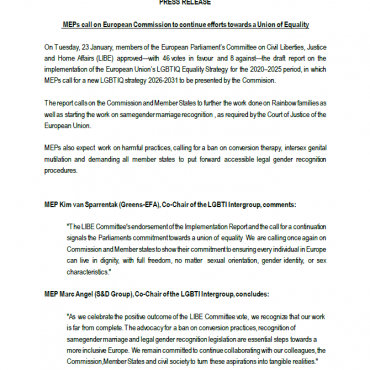EU Court: Permanent exclusion homosexual and bisexual men from blood donation may be justified
Yesterday, the EU Court of Justice (EUCJ) ruled that permanently banning men who have had sex with men (MSM) from blood donation, may be justified, depending on the situation in the country.
The case got to the EU Court after Mr Léger, a French national, was refused blood donation on grounds of his sexual relations with another man. French law excludes blood donations from MSM. The patient challenged the decision, leading Strasbourg’s Administrative Court to request the EU’s court’s opinion on the legality of refusing blood donations on the basis of one’s sexual orientation.
The EUCJ ruled that the Strasbourg Administrative Court will need to take account of France’s specific epidemiological situation to judge if permanent deferral of all MSM is justified.
Regarding adherence to the principle of non-discrimination on the basis of sexual orientation, the Court highlighted that the principle of proportionality might not be respected by systematic exclusion of men who have sex with men.
The EUCJ states that the national court has to verify whether more effective ways can also ensure a high level of health protection for blood recipients, without discriminating on the basis of sexual orientation.
In this respect, all available tests to check the blood of a donor and protect the health of recipients must have first been executed before imposing a permanent deferral.
Ian Duncan MEP, Vice-President of the Intergroup on LGBTI rights, reacted: “This ruling represents a missed opportunity by the Court of Justice.”
“In the UK we have already abolished lifetime bans for men who sleep with men, recognising that it is sexual behaviour not orientation that is important when determining whether someone can give blood. I hope member states will follow the example that the UK has set.”
Isabella Adinolfi MEP, Vice-President of the Intergroup on LGBTI rights, reacted: “Being gay or bisexual cannot automatically pose a threat to public health; but risky sexual behaviour in men or women, whether gay, bisexual or straight, is a real risk.”
“This ruling by the Court is disappointing. EU law states clearly that it is sexual behaviour, not sexual orientation, that should be the guide line in determining a person’s deferral from blood donation.”
Read more:






